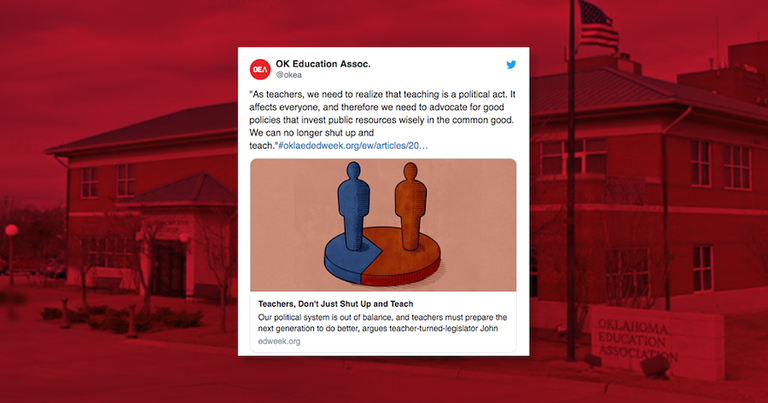
Education
Ray Carter | August 9, 2019
Union declares teaching is political
Ray Carter
Just weeks after roughly 60 of its members attended a conference where participants voiced support for abortion, transgender rights, reparations for slavery, and more, the Oklahoma Education Association tweeted that teaching “is a political act.”
On July 28, a message on the OEA’s official Twitter account stated, “As teachers, we need to realize that teaching is a political act. It affects everyone, and therefore we need to advocate for good policies that invest public resources wisely in the common good. We can no longer shut up and teach.”
"As teachers, we need to realize that teaching is a political act. It affects everyone, and therefore we need to advocate for good policies that invest public resources wisely in the common good. We can no longer shut up and teach."#oklaedhttps://t.co/1VssrqmPkC
— OK Education Assoc. (@okea) July 28, 2019
That text was a quote pulled from a linked “Education Week” article by Rep. John Waldron, a former teacher and Tulsa Democrat. In that article, Waldron decried an anti-abortion measure passed by Oklahoma lawmakers and criticized the decision to place $200 million into state savings. Waldron also compared “deep-red” states like Oklahoma to the Confederacy as examples of “government under single-party rule.”
Shortly after comparing proponents of slavery and modern lawmakers, Waldron wrote, “One of the reasons we have so many states run by one party is that we have learned to vilify the other side rather than listen to it.”
The OEA tweet is only the latest instance where union officials have voiced apparent support for the intermingling of teaching and politics.
In a 2016 column urging political activism, OEA president Alicia Priest declared that “everything about public education is political. The reforms, the elected school board, the State Superintendent of Public Instruction, the standards, your salary and benefits, the textbooks that are approved for your use—ALL politically driven decisions.”
Among the benefits of increased political activity, Priest wrote, was “the treasure of building power.”
Other union activists have been even more explicit in advocating political stances via the education system.
On Feb. 8, Priest tweeted a picture of herself and Aaron Baker, an 8th-grade history teacher in Del City. Both were attending the National Education Association Foundation Gala, and Priest noted Baker was an “OEA awardee” at the event.
That tweet was notable because Baker, who has also been a participant in the OEA’s delegate assembly, has often proclaimed that he injects politics into educational settings. Among other things, he has written that he teaches his students “that the phrase ‘law and order’ is steeped in systemic racism,” that “concentrated wealth multiplies poverty,” “that most of the time, when people kill people, they use guns,” and that “the greatest nuclear threat the world has ever seen is the United States of America.”
Baker has also written, “There are seeds of an Oklahoma Socialist revival germinating in the rich soil of progressive #oklaed.”
Some officials who have won election with OEA backing have avoided the explicit rhetoric of the union, but have often fallen in line with the union’s demands when it comes time to vote.
In a November 2018 video podcast with The Oklahoman, Sen. Cari Hicks, an Oklahoma City Democrat and former teacher who was endorsed by the OEA, downplayed the role of partisanship in policymaking.
“Education, to me, is nonpartisan,” Hicks said.
But she subsequently joined a party-line effort to block most of Gov. Kevin Stitt’s nominees to the State Board of Education. As a member of the Senate Education Committee, Hicks opposed confirmation of Carlisha Williams Bradley; William Flanagan, Jr.; Estela Hernandez and Jennifer Monies.
Hicks opposed Flanagan’s nomination after he expressed support for charter schools and virtual education and said officials could reduce administrative duplication and waste in Oklahoma schools.
Hicks announced her opposition to Hernandez and Monies before either nominee appeared before the committee. The Oklahoman reported that Hicks said she “was aided in her decision by a set of criteria put together by Democratic lawmakers focused on education,” but “declined to share the criteria.”
Stitt’s Board of Education nominees were opposed by the OEA.

Ray Carter
Director, Center for Independent Journalism
Ray Carter is the director of OCPA’s Center for Independent Journalism. He has two decades of experience in journalism and communications. He previously served as senior Capitol reporter for The Journal Record, media director for the Oklahoma House of Representatives, and chief editorial writer at The Oklahoman. As a reporter for The Journal Record, Carter received 12 Carl Rogan Awards in four years—including awards for investigative reporting, general news reporting, feature writing, spot news reporting, business reporting, and sports reporting. While at The Oklahoman, he was the recipient of several awards, including first place in the editorial writing category of the Associated Press/Oklahoma News Executives Carl Rogan Memorial News Excellence Competition for an editorial on the history of racism in the Oklahoma legislature.